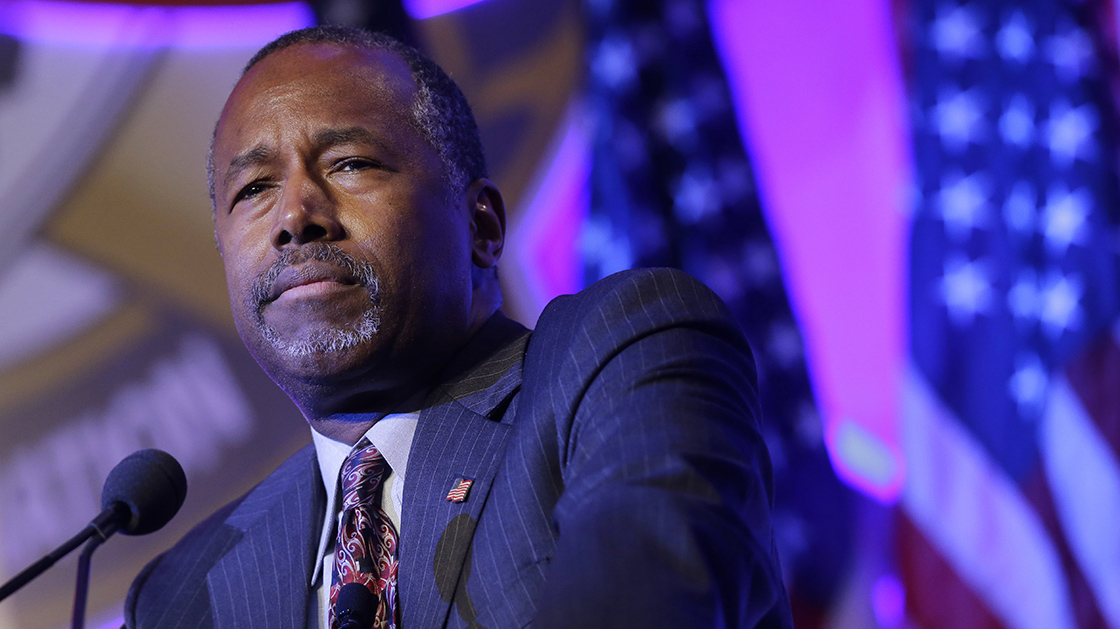
Donald Trump was looking for an excuse to "counterpunch” Ben Carson—and now he’s found one.
Carson, the soft-spoken pediatric neurosurgeon who has been steadily gaining in the polls, ratcheted up his criticism of Trump this week, questioning the bombastic real estate mogul’s commitment to his faith in the biggest schism to date between the two candidates currently leading the GOP pack. It's a moment that other campaigns have long been waiting for, eager to watch the two split up the conservative base.
Both Carson and Trump appeal to a vocal swath of GOP voters who are deeply disillusioned by, and angry with, Washington, and want to support a non-politician. Major stylistic differences aside, the biggest point of contention between the two candidates for now centers on how the two talk about faith. Carson, who is gaining on Trump in several polls among evangelical voters—and beats him with that demographic in Iowa—is leaning hard into that edge.
“I've realized where my success has come from and I don't in any way deny my faith in God," Carson said Wednesday at an event in California, when asked to name the biggest difference between himself and Trump, before going on to cite Bible verses.
Trump, who last week said that he was “hoping for Ben to really hit me at some point, because I love to counterpunch,” leaped at the opportunity to push back.
"Wow, I am ahead of the field with Evangelicals (am so proud of this) and virtually every other group, and Ben Carson just took a swipe at me," he tweeted Wednesday night.
The Trump response escalated Thursday morning.
Carson is "not a great religious figure," he said on CNN. "But for him to criticize me on my faith is absolutely—and for him to read from the Bible in his memory—it looked like he had memorized it about two minutes before he went on stage…Ben Carson is not going to be your next president, that I can tell you."
But Trump has raised hackles among evangelical voters—a core constituency in Iowa, in particular—for the flip way he has discussed religion.
At the Family Leadership Summit in Ames, Iowa, in July, Trump characterized himself as a devout Presbyterian and regular church-goer. But he also said he had never asked God for forgiveness. “If I do something wrong I think I just try and make it right. I don’t bring God into that picture. I don’t,” he said, shocking many religious conservatives who believe they owe their existence to God's forgiveness of their sins.
When Trump sought to clarify, he ended up making light of taking Communion. “When I drink my little wine — which is about the only wine I drink — and have my little cracker, I guess that is a form of asking for forgiveness, and I do that as often as possible because I feel cleansed,” he added.
And at an August rally in Alabama, Trump declared the Bible to be his “favorite book,” a claim he has repeated since. But asked later that month on Bloomberg’s “With All Due Respect” to name his favorite Bible verse, he declined, saying, “I wouldn't want to get into it. Because to me, that's very personal.”
Despite all that, Trump, the thrice-married former casino proprietor, still leads nationally among evangelicals, and among everyone else on the Republican side.
But the Carson campaign credits Trump with ushering in a zeitgeist that values outsider, non-politician candidates, giving their candidate an in, too. Carson, they say, has just as much outsider appeal, without the bullying tone—and Carson, who openly discusses his faith and the importance of God in his life, and has been married to the same woman for 40 years, is also a more natural fit with evangelical voters.
That constituency “doesn’t seem like a part of [Trump’s] base, it’s always been a part of Dr. Carson’s base,” said Carson communications director Doug Watts in an interview last week (he wasn't immediately reachable Thursday morning). “…It’s the broader Christian community that also includes evangelicals. They’ve always been very supportive of him, and now they find they’ve got a candidate they agree with on other issues, in other ways, maybe in personal style as well.”
Beyond religion, the two candidates have also come to blows over Carson’s level of experience. Last week, Trump said that as a doctor, Carson wasn’t creating jobs, a remark that caused Carson to play defense, noting this week his business work through serving on a number of corporate boards .
On Thursday, Trump dialed up the rhetoric, dismissing the renowned former Johns Hopkins neurosurgeon as "perhaps an OK doctor," and charging that "If you look at his past, he was heavy into the world of abortion."
As a physician, Carson did refer women with potentially neurologically damaged fetuses to doctors willing to perform abortions, and he has also conducted research on fetal tissue. But he maintains that he is staunchly opposed to abortion. Trump also has a squishy past on that issue: he once described himself as “very pro-choice" before changing his stance ahead of the 2012 GOP election, as he weighed a run.
Ted Cruz's supporters, who are also deeply conservative, are betting that Carson's and Trump's uneven backgrounds on social issues will eventually create a bigger opening on the right for the Texas senator to break through. But in the meantime, other campaigns, including more centrist ones, are enjoying the fireworks, hoping that Carson and Trump will further divide the conservative base—making room for a more moderate candidate to consolidate support.
“People definitely want to see some sparks between Trump and Carson because they’re competing for likely the same voters," said a Republican working for an establishment-leaning rival campaign. "And they have a chance to split some of the base voters attracted to both candidacies,”
- Publish my comments...
- 0 Comments
